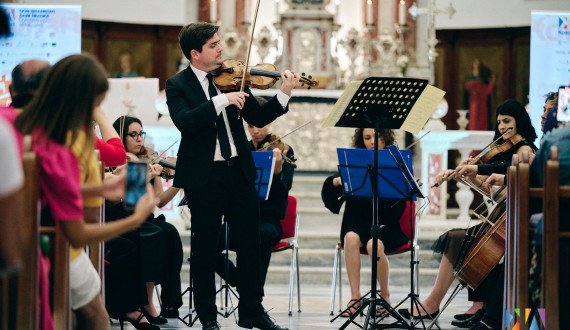Art that Breaks Down Social Barriers
Dealing with young artists is one of the important conceptual pillars of KotorArt Don Branko's Music Days, which, year after year, underlines the important values of contemporary society. After the festival ”upbeat“, when the students of the Vida Matjan Music School performed, and the gala opening of the Festival, when young soloists from the country and the region took part in the performance of opera works by European romantic composers that referred to Montenegrin history and culture in their librettos, the stage was ready for the members of the Camerata Balcanica Chamber Orchestra. Led by the young violinist and concertmaster Fedor Rudin, the ensemble performed works of classicism and romanticism – Wolfgang Amadeus Mozart, Franz Schubert and Edvard Grieg – on Thursday, July 14, to a full audience at the Church of Our Lady in Prčanj.

Although it was originally planned that after Mozart’s Divertimento in B-flat major, Joseph Haydn’s Violin Concerto in A major and Ludwig van Beethoven’s Pastoral Symphony would be performed, thus rounding off the repertoire stylistically in the context of Viennese classicism, the artists decided on somewhat different program selection, as announced in a welcome speech by Jovanka Višekruna, Artistic Director of ArtLink, the Festival out of whose ArtLink Young Virtuosos Ensemble Camerata Balcanica grew.
Fedor Rudin, a grandson of the famous Russian avant-garde composer Edison Denisov, is a violinist with a lot of stage experience, despite his young age. He is a laureate of the Premio Paganini competition in Genoa and the Giorge Enescu Competition in Bucharest. He studied under the renowned pedagogues, Miroslav Roussine and Svetlin Roussev. A graduate under Zakhar Bron at the Hochschule für Musik Köln and Pierre Amoyal at the Universität Mozarteum Salzburg, he completed his postgraduate studies at the Kunstuniversität Graz under Professor Boris Kuschnir. His interpretation of Schubert’s Introduction and Rondo for solo violin and strings was particularly convincing, in which, in the style of early Romanticism, he emphasized both his immense musicality and his exceptional skills as a soloist. Performing the Holberg Suite, Op. 40, musicians introduced the audience to the world of baroque dances from the sound perspective of a romantic composer Edvard Grieg. Through the Praeludium, Sarabande, Gavotte, Air and Rigaudon, the musicians skillfully highlighted the differences in character between the movements of the piece.
Besides working on the presentation of musical art, the Camerata Balcanica Chamber Orchestra, by selecting musicians from the Balkans, has a mission to present this region at its best through the prism of understanding ethnical diversity. The performance of this orchestra, composed of talented young musicians from the region, and their concertmaster Fedor Rudin, proves that a stimulating environment within the ensemble is a basis for a good interpretation. All the more so, Fedor Rudin’s captivating energy additionally contributed to the overall impression.
Boris Marković
